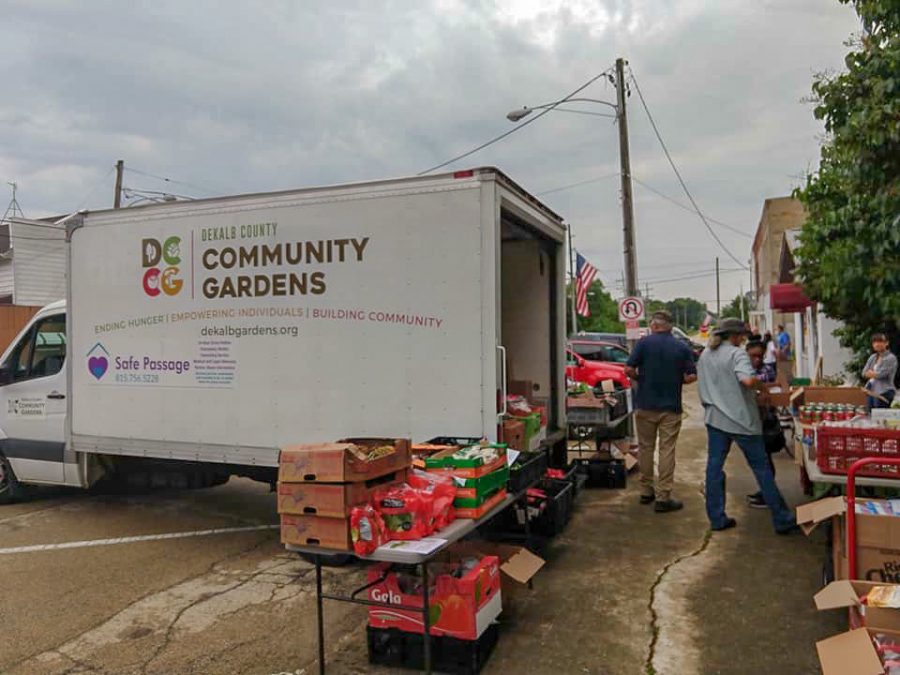Local food pantries seek to help residents as volunteer numbers decrease
Northern Star File Photo
Dan Kenney, executive director of DeKalb County Community Gardens, (left) sets up a Grow Mobile food distribution in Kingston with Christy Westman, Grow Mobile Program coordinator in 2019.
December 7, 2020
DeKALB – Food pantries in DeKalb have seen both surges in demand and drops in volunteer numbers in the wake of COVID-19 lockdowns, local food pantry administrators said.
Local food distribution centers around DeKalb County have seen the number of residents coming in triple and quadruple, compared to the same time frames a year ago, Heather Edwards, associate director of the DeKalb County Community Gardens, said. A distribution center that the organization opened in DeKalb in the wake of the COVID-19 restrictions has seen huge demand since its establishment.
“They’ve been serving pretty much 250 households every single Thursday since March,” Edwards said. “We immediately began seeing households that were impacted. We had many families that were using a food pantry for the very first time.”
Much of the food for pantries, like those run by the DeKalb County Community Gardens and the Huskie Food Pantry, are sourced from the Northern Illinois Food Bank, but produce is also contributed directly from charity grow-ops like the Walnut Grove Vocational Farm in Kirkland, pantry administrators said.
“Demand has definitely risen,” Melina Kuhn, program director at Walnut Grove said. “Our produce goes to the area food pantries, and I know they’ve had a hard time keeping up with demand.”
But at the same time, as demand surges, state-government imposed restrictions on human congregations have seen the usual number of volunteers significantly drop at Walnut Grove Vocational Farm, Kuhn said.
“We rely a lot on the school groups that would have normally come out here, but due to the restrictions, we’ve been very short on labor,” Kuhn said.
The strawberry and raspberry crop, in particular, was hit hard due to labor shortages, Kuhn said.
“They’re a very labor-intensive crop to harvest. We couldn’t get to all of them a couple of times,” Kuhn said. “But for the most part, we’ve been able to keep up with crop harvests. It’s really the rest of the garden maintenance that we’ve had trouble keeping up with.”
Kuhn said she hopes to see groups return in limited capacities in the spring but still expects needing to scale back operations.
Volunteer shortages have also affected NIU’s Huskie Food Pantry, which has seen its volunteer numbers drop to about half of what they were at the same time last year, Kay Nohelty, graduate assistant for volunteerism, said.
“There’s been less interest volunteer wise,” Nohelty said. ”I don’t know if it’s because there are less students on campus in general. Last year, there were a lot of programs that required volunteer hours, and I’m not sure if maybe these programs aren’t requiring these volunteer hours anymore, but it seems like there’s just less students around that need these hours.”
In addition to fewer volunteers, the Huskie Food Pantry has also seen a significant decline in demand.
“On average, we have about 30 students every Thursday. Before COVID our average was anywhere between 70 to 100,” Nohelty said.
She attributes the drop off to the low number of students who remain on campus, following the university encouraging students to remain at their family homes, rather than returning from Thanksgiving break due to COVID-19.
Edwards said she’s worried the state imposed restrictions will leave more residents out of work and needing assistance from the pantry.
“If there happens to be more restrictions put on our region and our state, which causes more businesses to close, we will probably see another uptick in the numbers of our neighbors that are visiting the food pantries,” Edwards said. “We’re figuring that even once the vaccine comes out, it is still going to be many months before our numbers here start going down.”







